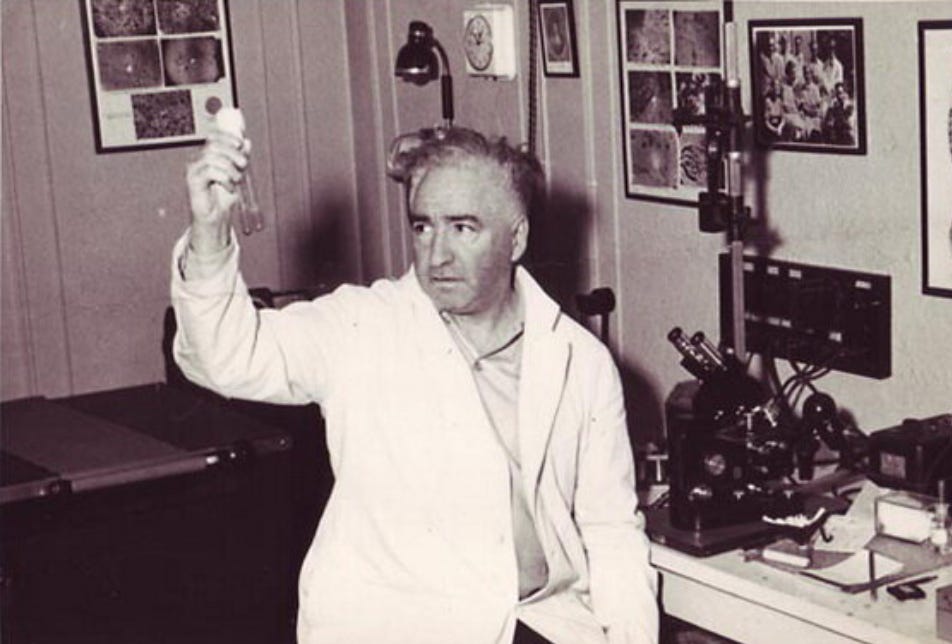Saturday Commentary and Review #175
Europe as the "Sick Man" of the Globe, Mossad's 'Spectacular' Hezbollah Hit, Wilhelm Reich: Instigator of the Sexual Revolution, Fake 'Blue Zones", Walking Through the Faroes
Every weekend (almost) I share five articles/essays/reports with you. I select these over the course of the week because they are either insightful, informative, interesting, important, or a combination of the above.
In 1992, negotiations over the Maastricht Treaty were concluded between the then-12 members of the European Community (EC). The treaty was to bring forward the “next step” in European integration, with promises of a common currency and common economic and foreign policy across member states. Its ratification triggered the re-naming of the organization, with the European Community officially becoming the European Union.
Expectations were initially high for this new entity, especially because everyone was still basking in the afterglow resulting from the fall of the Berlin Wall. Freedom, democracy, and liberty were the buzzwords of the day, alongside cooperation and integration. After four decades of hosting a nuclear standoff between the world’s two superpowers, things were looking up.
Just prior to the EU coming into effect, the Americans gave the newly-confident Europeans the task of trying to resolve the conflicts resulting from the collapse of Yugoslavia. The Europeans failed to do this, and the Americans stepped in to put an end to it, for better or for worse. Baby steps for the baby, it seemed.
Despite the introduction of the Euro and the expansion of the organization across the continent since then, the EU has not fulfilled its promise politically nor economically. The adoption of the Euro has not been universal, as several states opted out, choosing to continue to use their local currencies. Politically, Brussels has become more muscular, but is far, far away from being democratic, running roughshod over the sovereignty of member states in the process. Economically, 2008 dealt Europe a serious blow, one that it has yet to fully recover from. Even worse, Europe is now lagging behind the USA and China on the economic front, and the gap is growing wider every year.
“Sick Man Europe” is not a secret to anyone. It’s why the EU tasked former Italian PM (and Goldman Sachs alum) Mario Draghi with drawing up a strategy on how to make Europe more competitive economically:
Europe must invest twice as much as it did rebuilding after World War II, allow more tech and telecoms companies to merge and take drastic measures on defense spending, Mario Draghi said.
In a landmark report on how to stem the Continent's economic decline, the former European Central Bank (ECB) president said Europe needed to invest an additional €800 billion a year to drag itself out of a trough of low productivity and feeble growth that's pushing it behind the United States and China in the international pecking order. He called it an "existential challenge."As the bloc gears up for the next five years under a newly constituted European Commission, Draghi's 400-page report is meant to guide the work for Commission President Ursula von der Leyen and her revamped team. Many of his recommendations will need buy-in from all the bloc's 27 governments, something that may prove elusive.
“Herding cats” immediately springs to mind.
Check this out:
At the heart of Draghi's report is a demand for a massive private and public investment, the like of which has not been seen in Europe since the 1960s and 1970s. It would add up approximately to an additional €800 billion per year.
The increase in investment would be "unprecedented," he said. "If Europe cannot become more productive, we will be forced to choose. We will not be able to become, at once, a leader in new technologies, a beacon of climate responsibility and an independent player on the world stage. We will not be able to finance our social model. We will have to scale back some, if not all, of our ambitions."
He is right…but being right is no defense.
An example of what he proposes Europe should do:
The report argues for changes in competition rules that could see some tech and defense deals get EU approval more easily. Telecoms should face lighter regulation and be helped to scale up by defining the market as EU-wide, he said.
Reviews into mergers should also take into account the “innovation part of a merger” and economic security, Draghi said.
It’s no secret either that Europe suffers from severe overregulation. It’s regulatory environment does provide for a lot of jobs…..for regulators.
This bit is important:
Draghi is pushing for the EU to issue new common debt to fund its industrial and defense needs, something that is opposed by several governments, and which already seemed to put him at odds with von der Leyen when the pair appeared at a press conference in Brussels to launch the report. He admitted the topic was "very sensitive."
But there seems to be increasing agreement on the need to reform the EU's €1.2 trillion budget, diverting funds away from Europe's poorer regions toward industrial, digitalization and innovation policies. This would align Draghi with the plans the Commission is already putting forward and is looked upon favorably in Berlin.
Europe has long balked at a common debt strategy, something that Mr. George Soros has been urging the EU to adopt for some time now.
And for your weekend laugh:
At the core of Europe’s economic woes, the report argues, is the cost of energy for industry, which is currently forced to pay 158 percent more for electricity than in the U.S., and 345 percent more for natural gas.
Maybe shutting down nuclear power plants and blowing up Nordstream was not the best idea?
This strategy already seems DOA:
European Central Bank President Christine Lagarde strongly endorsed her predecessor Mario Draghi’s multibillion-euro plan to fix Europe’s stagnant economy, but said that governments would have to figure out how to afford it on their own.
“Structural reforms are not the responsibility of the central bank — they are the responsibility of governments,” Lagarde told a press conference in Frankfurt.
and:
Nowhere is the problem more acute than when it comes to money.
Draghi wants more joint borrowing. Having always been seen as a great taboo, the EU introduced it in a limited way during the Covid pandemic to help pay for economic recovery.
But a repeat appears to be blocked by a group of countries such as Germany and the Netherlands, which have low levels of debt and are loath to backstop their more indebted neighbors.
The problem isn't theoretical. Less than three hours had passed after Draghi finished his presentation before Germany’s Finance Minister Christian Lindner said that “Germany will not agree" to joint borrowing.
So much for that then. And it shows why there are limits to many of Draghi’s ambitions. More “own resources,” Brussels talk for EU-level taxes, require every country to agree to them before they can be introduced. And that seems almost impossible in this political landscape.
Other sources of cash, like tapping into EU funds set aside to help less-developed European countries catch up, run into similar political problems.
Prognosis: Continued Stagnation.
You gotta admit that the two-day double-tap strike on Hezbollah by the Israelis was very, very clever.
When Israel moved into the Gaza Strip last October to begin a punitive campaign against Hamas (and Gazans), Bibi stated that the war would last one year. A year has almost passed now, and the Israelis produced a ‘spectacular’ hit on Hezbollah this past week, a military force that they have been trading strikes with along the Lebanese-Israeli border for just as long as the conflict in Gaza has been going on.
Contrary to the predictions of alarmists, a regional war has as of yet not broken out in the Middle East, with Hezbollah content to lob shells across the border into Galilee (forcing 60,000 Israeli civilians out of their homes towards safety), and with Israel refusing to take the bait and move into Southern Lebanon onto Hezbollah’s booby-trapped home turf. Iran has shown zero desire to expand the war as well.
This incredible series of hits on Hezbollah these past few days do usher in a new phase in the conflict and threaten to unleash what we all know is an inevitable war: that being Israel and Hezbollah. Israel needs to push back Hezbollah in order to make Northern Israel safe again for its residents, but knows that moving into Southern Lebanon would be a dangerous trap for their soldiers. Hezbollah needs to continue to pressure Israel to make concessions regarding Gaza (and the West Bank) via shelling the IDF and Israel, but knows that they would get annihilated should they actually try and cross over the border. It’s all a bit complex:
Given the widespread assumption that Israel was behind the attacks, he believes that the country’s prime minister, Benjamin Netanyahu, is feeling the pressure from his failure to deliver a decisive victory against Hamas in Gaza or return more of the Israeli hostages to their families alive and well.
Hezbollah, meanwhile, is reeling from the damage the attacks have delivered to its command and control systems and the question is whether it is in any position to escalate, while its ally Iran is also not keen for an escalation into a regional conflict.
What I am reading is that these attacks have not impacted Hezbollah’s rocket force along Lebanon’s border with Israel….but it is impossible to wave away the damage done to Hezbollah’s reputation, and its communications security system.
Meanwhile, Tarek Abou Jaoude, who lectures in comparative politics with a particular focus on Lebanese affairs at Queen’s University Belfast, believes that both sides appear to be talking themselves into a more intense confrontation, which could mean all-out war.
Recent polling suggests that after 11 months of witnessing the conflict of Gaza, the people of Lebanon – despite being generally hostile towards Hezbollah which has implanted itself in their country as both a political and military state within a state – are increasingly supportive of Hezbollah’s regional policies.
Many Israelis, meanwhile, are tired of constant bombardment from Hezbollah rockets, which has displaced 60,000 of their fellow citizens in the country’s north. It’s a dangerous moment, he cautions.
What is missing from this equation is the presence of the US Navy in the Eastern Mediterranean. It gives Israel quite a lot of latitude in its actions, but the Americans do not want to see this war expand.
On the ‘legality’ of the attack:
Anybody celebrating the ingenuity and audacity of the pager attacks is missing an important point. While these attacks may have been aimed at Hezbollah’s communications systems with the aim of neutralising its command and control systems, it involved what appears to have been a fairly indiscriminate attack on people carrying Hezbollah-issued pagers and walkie talkies. It’s important to remember that Hezbollah is not just a military organisation. It’s also a political party with 15 of the 218 seats in the Lebanese parliament.
So the attack didn’t just involve military targets. Among its victims were children and other civilians, including Iran’s ambassador to Lebanon. International humanitarian law, which will determine the legality of these attacks, expressly forbids the targeting of civilians in war, writes Giacomo Biggio, an expert in international law at the University of Bristol.
There is a concerted effort to use lawfare against Israel, and the importance of this should not be minimized even if the USA has Israel’s back. This will see a set of several long, drawn-out processes to chip away at the legitimacy of the Israeli state.
A salient point:
Mark Lacy, a senior lecturer in politics, philosophy and religion at Lancaster University, specialises in changing nature of warfare and traces the weaponisation of everyday technology from the pages sci-fi novels to the battlefield and beyond. It’s important to remember, he writes, that what only state military might be able to achieve today, will inevitably be within the reach of terrorist groups and criminals in the near future.
So, should we worry that our mobile phones might turn on us in the way people’s pagers and walkies talkies attacked them in Lebanon this week? Perhaps not yet, Lacy concludes. But as he puts it: “In times of dramatic and rapid change in AI, drones, robots and cyberattacks, the only certainty is uncertainty in this complex, and often terrifying, world we are living in.”
Many observers expected Iran to retaliate over Israel’s strike on its soil last month. It has wisely chosen not to do so. Both the Iranians and Hezbollah have decided to use their brains instead of saving face.
This week’s series of attacks does call for a Hezbollah response, as they are too embarrassing for the militants, and cannot go unanswered. Like Israel, they are hemmed in by obvious traps that have been laid out for them, meaning that their options are limited. Serious retaliation also risks the outbreak of the inevitable Israel vs. Hezbollah war, a conflict that very few want to see happen at present.
If you’re an 80s kid, you will definitely remember this song and video:
It’s a brilliant song, and the video matches its quality.
Kate Bush has stated that the song was inspired by her reading of Peter Reich’s 1973 memoir “A Book of Dreams”. Peter Reich was the son of (in)famous radical psychotherapist Wilhelm Reich. The song specifically takes inspiration from Peter’s memories of living on a farm with his father while he was young, and how they would “cloudbust” using a machine his father built. Bush plays young Peter in the video, with recently-departed Canadian actor Donald Sutherland performing as the father, Wilhelm.
I’ve enjoyed this song since it first came out, and its legacy has only grown. However, it was only recently that I learned the story about what inspired it. Wilhelm Reich was, and continues to be, a very, very controversial figure, with some referring to him as the “instigator of the sexual revolution”:
James Panero: Well, sure. Let me start off by saying, when we talk about a revolution, usually we have some knowledge of its history, its instigators, battles, its outcomes. But what about the sexual revolution? Well, we have some sense that a revolution, a sexual revolution took place over the past 100 years. But then who started this revolution and why? After all, the human race seemed to have a workable understanding of sex before this revolutionary moment.
Yes, the answer is there was an instigator who started this war named Wilhelm Reich. He was the Karl Marx of the libido, who coined the term, "Sexual revolution," which he saw as the ultimate extension of the communist revolution. So what did sexual revolution mean to Reich? And how did he come to it? He was born in Austria-Hungary in 1897. He studied in Vienna and became a star pupil of Sigmund Freud. Reich's focus was childhood sexuality. Reich believed that children possessed what he described as a pure innate sexual drive, one that must be protected through political means from society's suppression. What caused this suppression? Well, fascism, Reich believed, and the family, which he saw as fascism's enforcement agent. And what would free children of this repression? What he called sexpol or sexual politics.
Reich’s ‘sexpol’ within communist currents of the 1930s:
Well, so he aligned himself in the early '30s with the Communist Party in Europe, and the Party actually tapped him to direct what it called its German Association for Proletarian Sex Politics. And in a series of proclamations and writings, Reich advocated for dismantling the family in favor of collectivist child-rearing and re-education. In his mind, Communist revolution could not be complete until the revolution took place in our own sexuality. What would this collectivist reeducation mean? Well, for him, it was the promotion of childhood masturbation. And so too was witnessing adults engaged in sex for children, something that he himself did frequently as a child.
Sex education as “a way to divest parents of their moral authority”:
Well, right, well, let me go back in his 1966 book, The Triumph of the Therapeutic, which is really a very good book, sharply critical of Reich, Philip Rieff notes that, "Sex education becomes the main weapon in an ideological war against the family. Its aim is to divest the parents of their moral authority." So I think we can really see here how sex education is more than just learning the birds and the bees, right? What is sex education today? It's often done in secret, secret from the family, from parental oversight. It's about how not to get pregnant, how to get an abortion, what to do if and when you get AIDS, never about how to create a healthy marriage and family. And so issues like this, pride and sexuality, this is an extension of Reich's thinking and his revolutionary thinking.
Too extreme for Freudians, and too extreme for communists too:
Right. Well, contraception, abortion on demand, these were radical ideas at the time Reich was proposing them, and they're now widespread as we know, because these would allow for sexuality outside of procreation. It would remove in a way, biological from the sexual. And for him that was essential for allowing the continuation of his pubescent childhood sexuality, that in his idea, in his mind was pure. And I should say that this sexual energy for him really became quite an extreme theory, almost comically extreme. So as I mentioned in the 1930s, he was prominent in European communist and psychoanalytic circles. However, he went too far for the Freudians. One colleague dismissed Reich as suffering from an insidious psychotic process. So he fell out with the Freudians and he fell out with the Communists. The Communists came to believe that, this is Communist literature, "There was no orgasm disturbances among the proletariat, only among the bourgeoisie." So the Communists didn't want to hear about Reich's sexual obsessions either.
So what happened is that Reich relocated to the United States shortly before the start of World War II and where he already was building up a following. And here he established a sexual research facility in Maine, which still exists today and looks like a Bond villain's lair that he called Orgonon. And it was here that Reich came to believe that sexual energy was not just a biological force, but a physical force which could be measured and harnessed to do all sorts of things from curing cancer to controlling the weather. For example, he believed that UFOs travel the universe on this orgone power. And so he developed a contraption called the Orgone Accumulator or Orgone Box for people to harness their own masturbatory energy.
Continued influence:
The FBI heard that Reich was making these boxes and selling them across state lines, and they arrested him for peddling false cures. Reich died in prison while awaiting trial in '57, but that doesn't mean that Reich didn't have a great deal of influence in elite American circles. For example, Saul Bellow, Dwight MacDonald, Norman Mailer, William Burroughs were some of the writers who fell under his sway. And interestingly enough, in the decades after Reich's death, Roger Straus, of Farrar, Straus and Giroux, saw to it that all of Reich's writings were reissued in translation. So we can see him starting to permeate through the culture. Reich's biographer, Sharaf mentions that Reich's metaphors of a man and a trap of his own armor became the coin of the realm of therapeutic talk in the 1970s. So this idea that there's a secret force is very popular in progressive rhetoric, a secret hidden force, whether it's the commodity fetish or structural institutional racism and Critical Race Theory, in a way for them, the less you acknowledge it, the worse it is and the more you are involved in perpetuating.
more:
As you say, a lot of what Reich was doing, he believed he was harnessing this hidden energy field, but he was also destroying biology in a certain way to do it. He wasn't acknowledging biology as the force. He thought it was a physical force. So I think this transgenderism, it's again, an attack on biology. You're not transitioning, of course to something new. You're destroying your own biology to create a kind of astral figure that has no grounding in the real world or in your own cells or DNA.
So there is a connection there, I think in the method of thinking. And before, you were talking about the birth rates, children out of wedlock. I addressed this a bit in my article too. We are facing a generational crisis as reproduction rates plummet and children born out of wedlock continues to rise. The reality is the sexual revolution has been such a triumph for Wilhelm Reich and his thinkers. At the same time, it's been a catastrophe for contemporary society. If anything, we don't need more lessons in sex ed on how to put prophylactics on a banana, and people need to know how to build families, and that's not what we're hearing. And that's very much because of Reich.
To me, it seems that Reich can be summed up as “the liberation of the individual from the constraints of biology”.
What do you guys think?
I think it was back in the late 80s or early 90s when stories would appear in western media about certain Caucasians (mainly Armenians) who would live well into their 100s. The typical story would involve some remote village in a highland where you would find a few dozen people over the age of 95, with some approaching 120.
Skeptics lashed out, and with good reason. A new research paper (pre-print for now) has been published that “proves” that such claims are the fault of either clerical errors or pension scams:
Dr Newman received the award for research that revealed fundamental flaws in extreme old-age demographic research, by demonstrating that data patterns are likely to be dominated by errors and finding that supercentenarian and remarkable age records exhibit patterns indicative of clerical errors and pension fraud (paper pre-print, not yet peer-reviewed).
These results build on a long history of scepticism. Dr Newman has previously disproved a 2016 study published in Nature on extreme-age research that accidentally rounded off a substantial amount of its data to zero. His peer-reviewed paper demonstrated that if corrected, this error eliminated the core findings claiming that human lifespan had a defined limit. Then, Dr Newman also countered a 2018 paper which made the opposite claim and, in the process, demonstrated a theoretical result predicting that patterns in old-age data are likely to be dominated by errors.
‘Blue Zones’:
In the process, Dr Newman revealed that the well-publicised “Blue Zones” claims for the secrets of longevity are infallibly flawed.
Dr Newman showed that the highest rates of achieving extreme old age are predicted by high poverty, the lack of birth certificates, and fewer 90-year-olds. Poverty and pressure to commit pension fraud were shown to be excellent indicators of reaching ages 100+ in a way that is ‘the opposite of rational expectations’.
In addition, Dr Newman revealed numerous flaws in the supposedly validated cases of the world’s oldest people, including the world’s oldest man, who was shown to have not one but three birthdays.
more:
Many, if not most of the centenarians in the ‘Blue Zone’ have turned out to be alive in the government records but were deceased in reality. Using extensive government data and surveys, Dr Newman showed that most of the dietary and lifestyle claims behind the so-called ‘Blue Zone’ regions of high longevity are not supported by any independent data.
For example, despite vegetables and sweet potatoes being promoted as key components of the Okinawan ‘Blue Zone’ diets, according to the Japanese government, Okinawans eat the least vegetables and sweet potatoes in Japan and have the highest body mass index.
This forms one of a series of papers debunking old-age records including forthcoming work on the United Nations late-life data in which extreme longevity appears to be concentrated in Monaco, Malawi, Kenya, Western Sahara, Puerto Rico, and other regions.
I know a French marine biologist who is working at a maritime institute here in Dalmatia. He works on longevity, specifically focusing on a type of starfish found in the Adriatic that has the ability to re-generate appendages. Cosmetics companies are very, very interested in his research.
“Let me guess: applying this to humans would mean that we would be fighting cancer in our bodies for decades?”, I asked. “As it stands right now: yes”, he replied.
We end this weekend’s SCR with FbF friend and part two of his walk through the Faroe Islands:
By the end of my first week here I began to agree with my cab driver from the first hour after I arrived, which is the human built infrastructure is as, if not more, impressive than the natural beauty, and while I doubt few would want a guided tour of it, you could easily compile a list of the top ten Faroese engineering marvels.
Near the top would be the conspicuous projects, like the three-mile sub-sea tunnel with a round-about in it, since it connects three different islands. But it’s the more mundane projects that impressed me most, such as the power lines strung improbably high, arching across fjords, cliffs, and mountains, that keep all the islands electrified, and the network of cell towers, found on every fogged-in peak that looks impossible to reach, much less build something on, that mean no matter where you are you always have five bars.
Click here to read the rest.
Thank you once again for checking out my Substack. Hit the like button at the top or the bottom of this page to like this entry, and use the share and/or res-stack buttons to share this across social media. Leave a comment below if the mood strikes you to do so. And don’t forget to subscribe if you haven’t done so already.
And don’t forget to join me on Substack Notes!











Hit the like button at the top or bottom of this page to like this entry. Use the share and/or re-stack buttons to share this across social media. Leave a comment if the mood strikes you to do so.
And please don't forget to subscribe if you haven't done so already!
Total speculation here but I think Reich and his acolytes used his bat-shit crazy science as an excuse for pedophilia. And given the bat-shit crazy drag queen story hours, I'd say it's all the same thread.